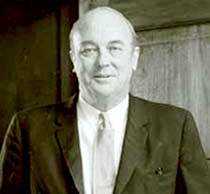Sir Henry Tucker, Bermuda
Here is a tribute to Henry Tucker, a great Bermudian who went on to become the first Government Leader, i.e. the first Premier of Bermuda. He was also the number one person (the General Manager) in
Bank of Bermuda and also a key player who was instrumental in laying the base for International Business in Bermuda.
The reason why he features on my list of Great Bermudians is because he did all this by himself without having a political background or support, neither any parental wealth to leverage on during his initial life.
Henry Tucker was born on March 14, 1903 at the Flatts Village. His Bermudian parents had ancestral roots with the first British settlers in the island. His father ran a sports shop while his mother was a bookkeeper in Saltus Grammar School in Bermuda.
At the age of 17 he was sent to a boarding school in England - The Sherborne School in Dorset. This is where his education ended as his parents could not afford the expenses for his higher studies. After schooling he returned to Bermuda and found a job with the shipping company Watlington and Conyers.
But this was never his cup of tea. He always wanted to make a fortune and soon headed for the Oklahoma Oilfields with one of his close friends. When the dream got shattered, he had to return to Bermuda and take up a teachers job in
Saltus Grammar School. As he kept awaiting his luck, he met up with Catherine, a lady from the U.S who came to Bermuda on her vacation. She was a nurse. Henry followed her back to the U.S and got a day job there in a trust company. He also took up a night course at the American Institute of Banking. In 1925 he married Catherine.
Henry later worked in brokerage firms and once opened his own firm with other partners. But he lost all his savings in the 1929 stock market crash. Unlike many others in his trade, he did not lose his heart and continued to struggle through the hard time until his real professional break came in 1934. He got an offer from the
Bank of Bermuda for the job of Secretary, which was then the number two position in the company.
His prosperity began as he came back and settled in Bermuda. He built his house in Camden Estate in Paget, a part of which later became the
Botanical Gardens. This property was inherited by his father from his first cousin. Tucker's two sons were born in the US, Henry James and Robert. He had a daughter Judith who was born in Bermuda.
Soon after returning to Bermuda, Henry Tucker founded the Forty Club whose members were the rich merchants owning large properties and businesses in Hamilton. In 1938, Tucker became the General Manager, the number one person in the Bank of Bemuda and at the same time was elected in the Parliament to represent Paget Parish.
Tucker had huge support from the wealthy white community. Those days only the citizens owning properties had the right to vote. And his Forty Club was a great strategic move that helped him in politics in this regard.
Henry Tucker founded the United Bermuda Party (UBP) in the year 1964, a year after the black dominated Progressive Labor Party (PLP) was formed. In 1968 the first ever election was held in the Parliament with the two constituent parties.
By then the Universal Suffrage or equal voting right was already in place. UBP won 30 seats to PLP's only 10. And Henry Tucker became the Bermuda's first Premier or the Government Leader. He remained as the Premier for 4 years until December 1971 when he resigned.
During his stint in the parliament, Bank of Bermuda received the go ahead to establish trusts for the wealthy foreigners and overseas clients. Tucker came up with the idea that the International companies be exempted from having a 60% share holding by a Bermudian which was (and still is) the policy for all local businesses. Slowly the
International Business was born in Bermuda which is the largest contributor to the Island's Economy today.
There was a time when Henry Tucker strongly opposed the Women's Voting Rights and the Universal Suffrage. However with time and due to increasing pressures from the black community, he learned to change, rise over racial discriminations and party politics, and was instrumental in establishing women's voting rights in the island.
During his time in the parliament, amalgamation took place in the government schools that were earlier segregated between the whites and the blacks. During the second world war in 1940, the US military wanted to setup base at the heart of Bermuda that would have split the island into two parts.
Henry Tucker was instrumental in negotiating and proposing an alternative solution as a result of which the US base was finally set up at the eastern far end of the island at St. Davids so that the remaining island remained undisturbed.
Henry Tucker was knighted twice by Queen Elizabeth II of England, once in 1961 and then again in 1971 for all his contributions to Bermuda. And therefore he acquired the title Sir.
Over the years Tucker became a very wealthy man and one of the richest in Bermuda. He was a keen stamp collector. In 1978, his collections were sold in London for $1 million. When he died at the age of 82 on January 9, 1986, he was a director of numerous companies and had huge properties. During his final years of life, there were many nurses and caretakers who took care of him and his properties. His wife had died several years earlier.
|
 By Raj Bhattacharya By Raj Bhattacharya
Raj, a seasoned travel writer and Bermuda destination expert, has extensive global travel experience. This website reflects his profound insights, garnered over nearly two decades of dedicated findings and research on the island. Raj has assisted countless Bermuda-bound visitors by providing direct, personalized responses to their queries and imparting his wealth of knowledge through this platform. This site serves as an indispensable guide for those seeking informed and reliable insights into Bermuda's treasures.
|
Related Articles
|
Viewers Stories and Reviews
Kathryn Correia Grossman
Your website states that Sir Henry worked in Brokerage houses in the US. I don’t know his full history. His grandsons are childhood friends of mine. I will get the facts and send them to you. However, I do know that Sir Henry was extremely successful in his undertakings in the US. He made millions. He also owned and donated the entire property known today as the Botanical Gardens to Bermuda. He originally owned all the Botanical Gardens and the property directly across from it on south shore road.
He had the title of SIR which means he was knighted by the queen of England. It would be interesting to know why. It takes something major to get such recognition. He also raised four grandchildren alone. One of his sons was killed in an accident. I believe it was a bike accident. This son had four children: Daniel, Scott, (a daughter) and the youngest James. The children’s mother gave custody to Sir Henry and she moved to England. Sir Henry sent all the kids to the US to attend prominent educational boarding schools. Dan went to college in Canada. Scott may have attended college in the US.
On each and every school holiday and vacation the kids came home to Bermuda. The children stayed in their father’s family home on the Tucker property which is now lived in by Jamie and is the farthest to the left when looking at the property from South Shore.
Sir Henry’s wife had long passed. Sir Henry had cooks and employees to tend to estate and his needs. The grandchildren were expected to attend all meals at set times in the main house with Sir Henry right up until the day he died. Each grandchild inherited one house on the Tucker Estate with the other son inheriting the main house. The children are all neighbors.
Dan and Scott later started the notorious Tucker Tees T-shirt business and were highly successful. Jamie did not attend college. He started a painting company in Bermuda and has been very successful. All of the children shared the talent of art.
|

 By Raj Bhattacharya
By Raj Bhattacharya